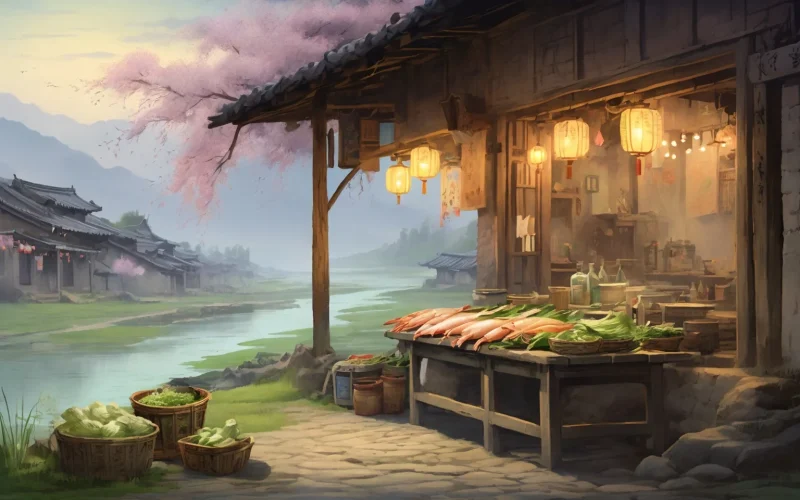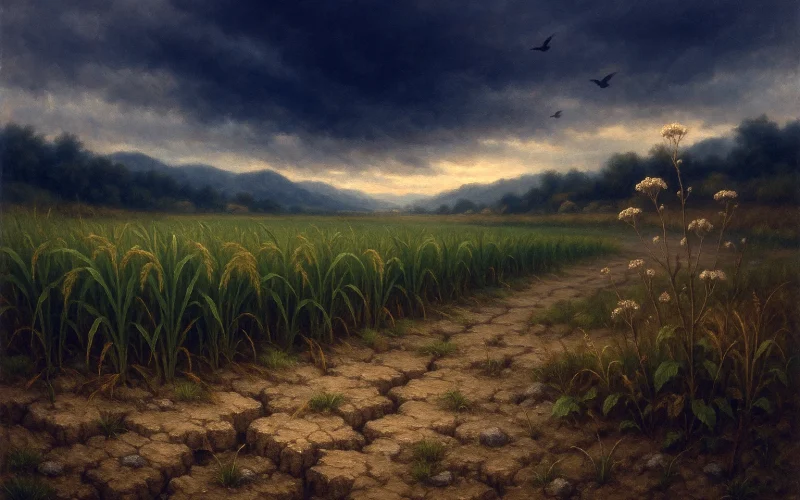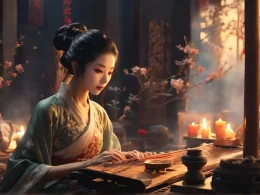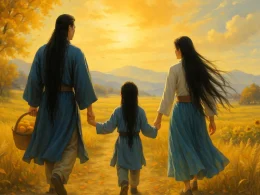O! Could my heart that little plot forsake?
But printed lines new thirst for knowledge wake.
Geese trace spring north, autumn south—their art,
But willow-thoughts outshine the oriole's heart.
Market-fresh fish, tavern wine's warm flow,
Flowering cabbages in late spring's glow.
Drunk at the long pavilion—care's release,
Nature's wild tease but adds to inner peace.
Original Poem
「宿横冈」
杨万里
我岂忘怀一亩居,谁令爱读数行书。
秋南春北雁相似,柳思花情莺不如。
上市鱼虾村店酒,带花菘芥晚春蔬。
长亭一醉非难事,造物相撩莫管渠。
Interpretation
Composed by Southern Song poet Yang Wanli during his travels. Henggang lies within present-day Jishui County, Jiangxi, near the poet's hometown. Despite a career marked by setbacks and constant travel between north and south, Yang maintained a deep love for nature and concern for common people. This poem likely originated during his later years, inspired by a night's stay at Henggang while journeying for official duties or returning home. It interweaves travel-induced contemplation, pastoral joy, and enlightened reflections on life's impermanence.
First Couplet: "我岂忘怀一亩居,谁令爱读数行书。"
Wǒ qǐ wànghuái yī mǔ jū, shuí lìng ài dú shù háng shū.
How could I forget my dwelling on that single plot of land? Yet my love for reading lines of books compelled me onward.
Opening with personal revelation, the poet affirms he never truly abandoned rustic life. "Single plot dwelling" (一亩居 yī mǔ jū) evokes reclusive aspirations, while "lines of books" (数行书 shù háng shū) signifies the scholarly path that led to official service. This couplet balances self-reproach with self-justification.
Second Couplet: "秋南春北雁相似,柳思花情莺不如。"
Qiū nán chūn běi yàn xiāngsì, liǔ sī huā qíng yīng bùrú.
Geese fly south in autumn, north in spring—their patterns ever constant;
But human attachments—willow-longings, blossom-passions—pale beside nature's effortless grace.
Migratory geese symbolize nature's eternal rhythms, while "willow-longings, blossom-passions" (柳思花情 liǔ sī huā qíng) metaphorize the fickle emotions of human affairs. The contrast between enduring nature and transient humanity carries profound philosophical weight.
Third Couplet: "上市鱼虾村店酒,带花菘芥晚春蔬。"
Shàngshì yú xiā cūn diàn jiǔ, dài huā sōng jiè wǎn chūn shū.
Fish and shrimp at market, village tavern wine;
Flowering cabbages and mustard greens—late spring's fresh bounty.
Shifting from reflection to vivid vignettes, this couplet paints rustic commerce with warm immediacy. Fish, wine, and flowering vegetables compose an idyllic rural tableau, revealing the poet's affection for simple living.
Fourth Couplet: "长亭一醉非难事,造物相撩莫管渠。"
Chángtíng yī zuì fēi nán shì, zàowù xiāng liáo mò guǎn qú.
Drinking deep in the roadside pavilion—no hardship at all;
When the Creator teases, pay it no mind.
Concluding with wine-induced acceptance, "the Creator's teasing" (造物相撩 zàowù xiāng liáo) encapsulates life's capricious challenges. The defiant "pay it no mind" (莫管渠 mò guǎn qú) embodies transcendent detachment.
Holistic Appreciation
Set against a traveler's night lodging, this poem intertwines life reflections with grounded observation. It begins with the tension between scholarly ambition and pastoral longing, progresses to contrast nature's permanence with human impermanence, then shifts to celebrate rustic abundance through market scenes, culminating in wine-soaked reconciliation with fate. Blending philosophy and domesticity, it achieves resonant depth through seamless fusion of scene and sentiment.
Artistic Merits
- Philosophy embedded in imagery: Migratory geese mirror life's cycles; village fare embodies contentment.
- Colloquial freshness: Vernacular terms like "fish and shrimp" (鱼虾 yú xiā) and "village tavern wine" (村店酒 cūn diàn jiǔ) exemplify Yang's signature Chengzhai style.
- Emotional progression: Nostalgia → existential reflection → rustic joy → transcendent acceptance.
- Harmony of depth and accessibility: Profound insights rendered through tangible, lived moments.
Insights
This work reveals how to meet life's unpredictability with both clear-eyed acceptance and undiminished wonder. Like the poet, we may find solace not in denying hardship but in savoring fleeting beauties—market bustle, seasonal greens, shared wine. It teaches that grace emerges when we release resistance to the Creator's teasing, discovering poetry within the mundane and serenity amid impermanence.
About the Poet
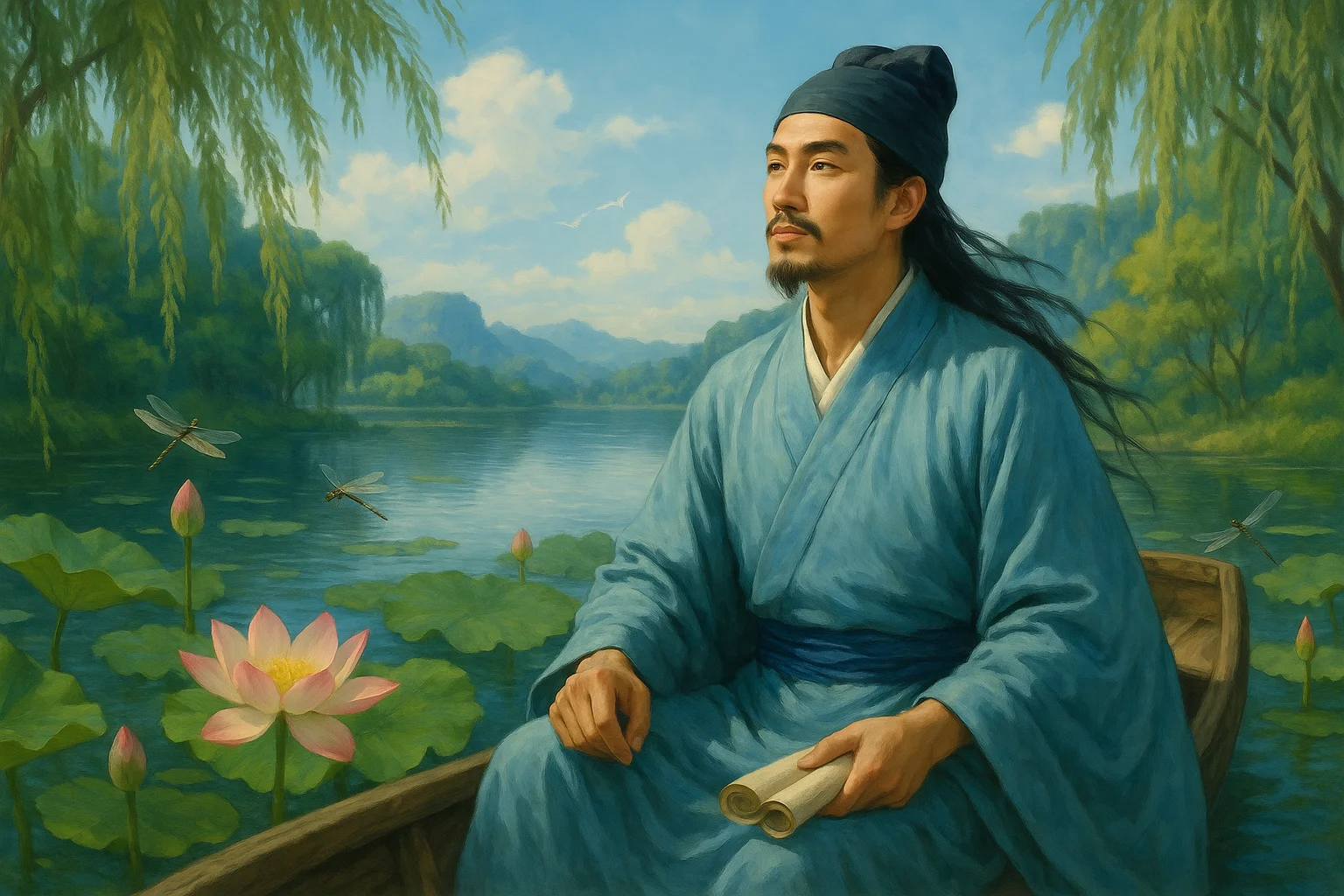
Yang Wanli (杨万里 1127 - 1206), a native of Jishui in Jiangxi, was a renowned poet of the Southern Song Dynasty, celebrated as one of the "Four Great Masters of the Restoration" alongside Lu You, Fan Chengda, and You Mao. He attained the jinshi degree in 1154 and rose to the position of Academician of the Baomo Pavilion. Breaking free from the constraints of the Jiangxi School of Poetry, he pioneered the lively and natural "Chengzhai Style," advocating for learning from nature and employing plain yet profound language. His poetry, often drawing inspiration from everyday life, profoundly influenced later schools of lyrical expression, particularly the Xingling (Spirit and Sensibility) School.






